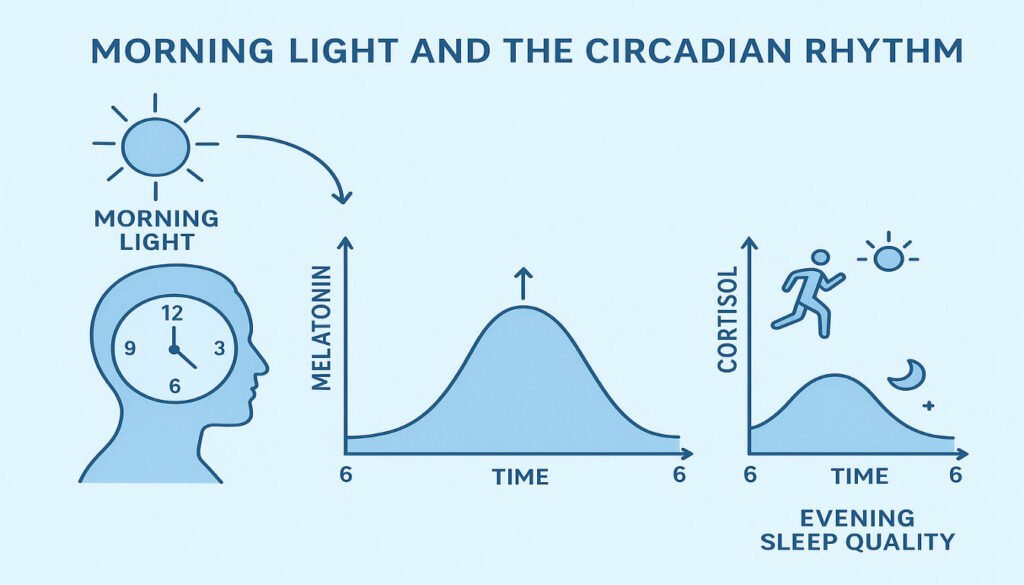Struggling with restless nights? The solution might actually begin with how you start your day. A strategic morning routine for better sleep can reset your body’s internal clock, boost your energy levels during the day, and prepare your system for quality rest when night falls. This science-backed approach addresses sleep issues at their source rather than just treating symptoms.
In this comprehensive guide, we’ll explore how specific morning habits directly influence your sleep quality and provide you with actionable steps to create a morning routine that will help you fall asleep faster and enjoy deeper, more restorative sleep tonight.
Understanding How Morning Routines Impact Sleep Cycles
Morning light exposure helps regulate your circadian rhythm, which controls sleep-wake cycles
Your body operates on a 24-hour internal clock known as the circadian rhythm. This biological timekeeper regulates numerous functions, including your sleep-wake cycle, hormone production, and even body temperature. When your circadian rhythm is properly aligned, you naturally feel alert during the day and sleepy at night.
Morning activities have a profound impact on this internal clock. Exposure to natural light first thing in the morning signals to your brain that it’s time to be awake and alert. This morning light exposure actually helps set the timer for when your body will release melatonin—the sleep hormone—approximately 14-16 hours later.
The Science Behind Morning Light and Sleep Quality
Research from sleep medicine specialists shows that morning light exposure helps synchronize your circadian rhythm, making it easier to fall asleep at night. When your eyes detect morning sunlight, specialized receptors send signals to the suprachiasmatic nucleus (SCN)—your brain’s master clock—which then coordinates your entire day-night cycle.
“Morning light exposure is one of the most powerful tools we have for regulating the circadian rhythm and improving sleep quality. Just 15-30 minutes of natural light within an hour of waking can significantly impact your ability to fall asleep that night.”
Without proper morning cues, your internal clock can drift, leading to difficulties falling asleep at night, frequent waking, and poor sleep quality. This explains why consistent morning routines are so effective for addressing sleep problems.
Key Elements of an Effective Morning Routine for Better Sleep
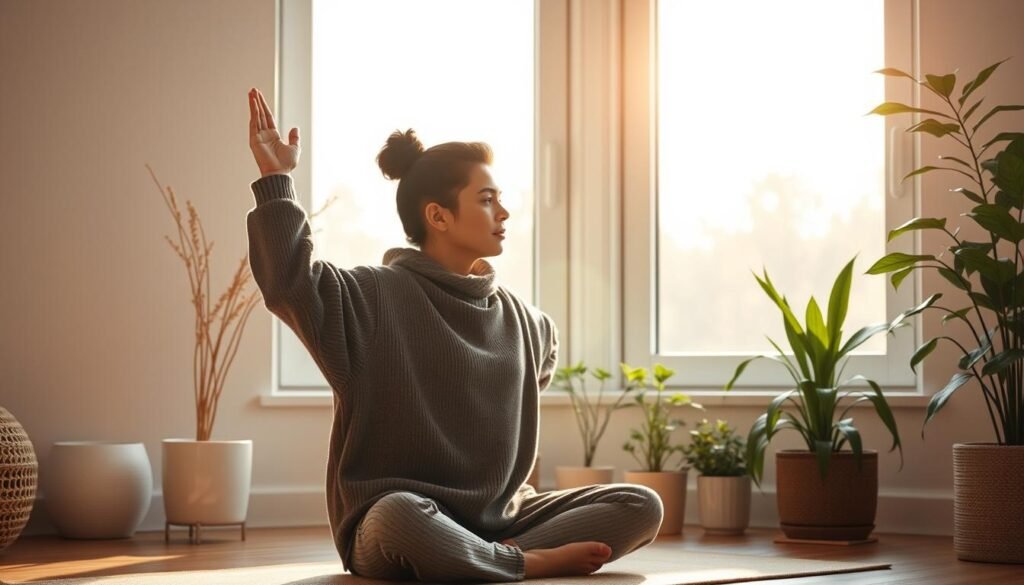
Creating a morning routine that promotes better sleep involves several key components that work together to regulate your circadian rhythm and prepare your body for quality rest later. Let’s explore the essential elements:
1. Consistent Wake Time
Waking up at the same time every day—even on weekends—is perhaps the single most important factor for sleep hygiene. This consistency reinforces your body’s sleep-wake cycle and helps regulate melatonin production.
Pro Tip: Set your alarm for the same time each morning, including weekends. If you must sleep in on weekends, limit it to no more than one hour past your regular wake time to avoid disrupting your circadian rhythm.
2. Morning Light Exposure
Natural light exposure within 30-60 minutes of waking is crucial for resetting your circadian rhythm. This morning light suppresses melatonin production and increases cortisol and serotonin, helping you feel alert during the day and sleepy at night.

3. Physical Activity
Morning exercise has been shown to improve sleep quality by reducing the time it takes to fall asleep and increasing the amount of deep sleep you get. Even light activity like stretching or a short walk can make a difference.
Benefits of Morning Exercise:
- Reduces stress hormones that can interfere with sleep
- Increases body temperature, which naturally drops later, promoting sleepiness
- Releases endorphins that improve mood and reduce anxiety
- Enhances daytime alertness, making you naturally tired by evening
Best Morning Activities for Sleep:
- Yoga or gentle stretching
- Walking outdoors (combines exercise with light exposure)
- Light cardio (15-30 minutes)
- Tai Chi or other mindful movement practices
4. Hydration and Nutrition
What you consume in the morning affects your energy levels throughout the day and your ability to sleep at night. Proper hydration and balanced nutrition help stabilize blood sugar and energy levels.

Morning Foods That Promote Better Sleep
- Protein-rich breakfast (stabilizes blood sugar)
- Complex carbohydrates (provides steady energy)
- Magnesium-rich foods like nuts and seeds
- B-vitamin foods like whole grains
Morning Habits That Disrupt Sleep
- Excessive caffeine consumption
- Skipping breakfast (leads to energy crashes)
- High-sugar foods (causes energy spikes and crashes)
- Dehydration (can cause fatigue and poor sleep)
Transform Your Sleep Quality With Our Complete Guide
Want to dive deeper into sleep optimization techniques? Our comprehensive ebook “Sleep Hacking” provides a complete system for improving your sleep quality, including advanced morning routines, evening protocols, and personalized sleep strategies.
How Morning Activities Directly Influence Nighttime Sleep
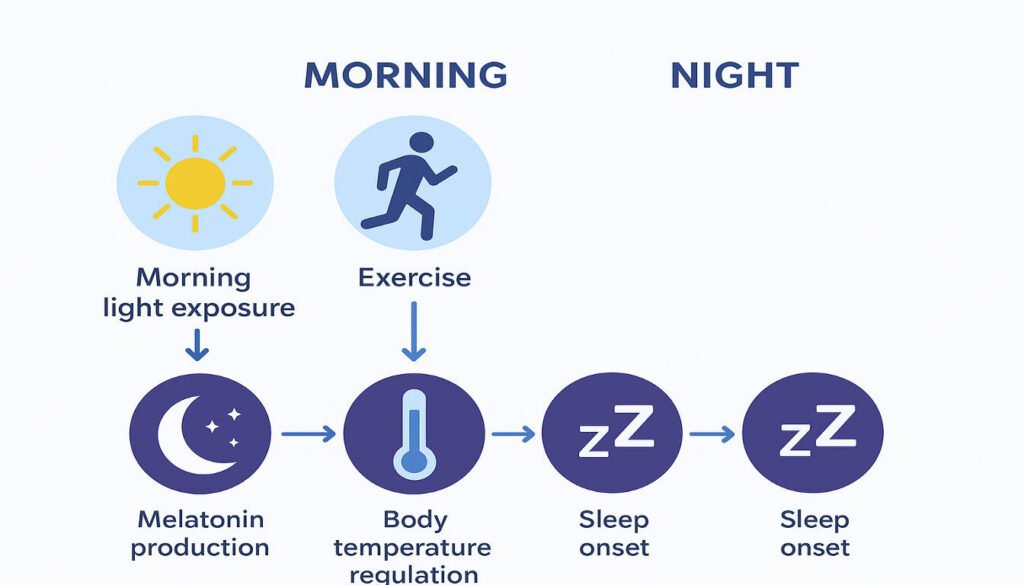
The activities you engage in during the morning hours have a direct and measurable impact on your sleep quality that night. Understanding these connections can help you prioritize the most effective morning habits.
Morning Light and Melatonin Production
Exposure to bright light in the morning, especially natural sunlight, suppresses melatonin production and signals to your brain that it’s time to be awake. This morning reset helps your body produce melatonin at the appropriate time in the evening, typically beginning about 2 hours before your natural bedtime.
Morning Exercise and Sleep Architecture
Physical activity in the morning has been shown to increase the amount of slow-wave (deep) sleep you get at night. This type of sleep is crucial for physical restoration and immune function. Morning exercise also helps reduce stress hormones like cortisol, which can interfere with sleep when elevated at night.

Consistent Morning Routine and Anxiety Reduction
A predictable morning routine reduces decision fatigue and morning stress, which can have lasting effects throughout the day. Lower daytime stress levels translate to reduced nighttime anxiety—one of the primary causes of insomnia and sleep disturbances.
“Establishing a consistent morning routine helps regulate your body’s stress response system, lowering cortisol levels in the evening when they should naturally decline to prepare for sleep.”
Morning Caffeine Timing and Sleep Onset
The timing of your morning caffeine consumption significantly impacts your ability to fall asleep at night. Caffeine has a half-life of approximately 5-6 hours, meaning half of it remains in your system that long after consumption.
| Caffeine Timing | Impact on Sleep | Recommended Cutoff |
| Within 30 minutes of waking | Minimal disruption to sleep | Before 10 AM |
| Mid-morning (9-11 AM) | May affect sensitive individuals | Before noon |
| Afternoon (12-3 PM) | Moderate disruption for most people | Not recommended |
| Late afternoon/evening | Significant disruption to sleep onset | Avoid completely |
Creating Your Effective Morning Routine for Better Sleep

Now that we understand the science behind morning routines and sleep quality, let’s build a practical framework for creating your own sleep-enhancing morning routine. Remember that consistency is key—the most effective routine is one you can maintain daily.
Step 1: Optimize Your Wake-Up Process
Essential Wake-Up Habits:
- Set a consistent alarm time (even on weekends)
- Avoid hitting snooze (disrupts sleep cycles)
- Use a sunrise alarm clock for gentle awakening
- Keep your phone away from your bedside
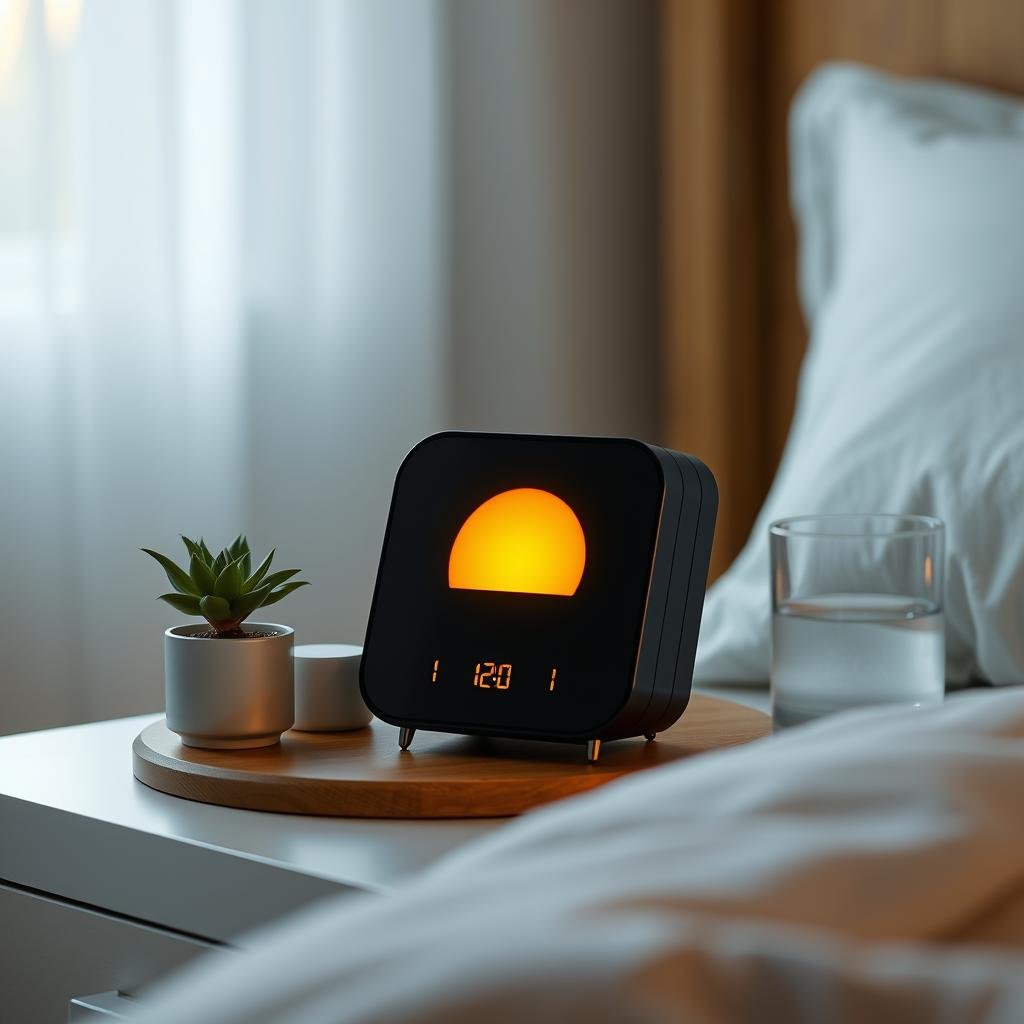
Step 2: Expose Yourself to Natural Light
Within 30-60 minutes of waking, aim to get exposure to natural daylight. This crucial step helps reset your circadian rhythm and signals to your body that it’s time to be alert and active.

Light Exposure Tips:
- Open curtains or blinds immediately upon waking
- Eat breakfast near a window or outdoors if possible
- Take a short morning walk outside
- If natural light isn’t available, use a light therapy lamp (10,000 lux) for 20-30 minutes
Step 3: Incorporate Gentle Movement
Morning physical activity doesn’t need to be intense to be effective for sleep improvement. Even light movement can help regulate your circadian rhythm and reduce stress hormones.
5-Minute Morning Movement Routine:
- Gentle stretching or yoga poses (2 minutes)
- Deep breathing exercises (1 minute)
- Light cardio like marching in place (1 minute)
- Shoulder and neck rolls to release tension (1 minute)
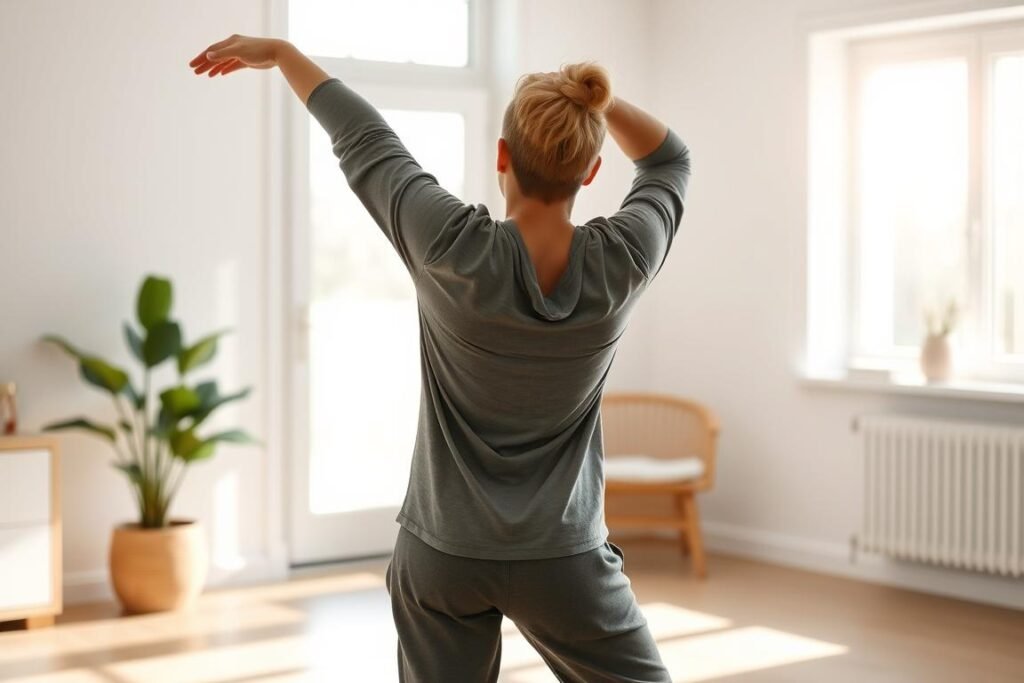
Step 4: Hydrate and Nourish
What you consume in the morning sets the stage for your energy levels throughout the day, which directly impacts your sleep quality at night.

Morning Hydration:
- Drink 16oz of water within 30 minutes of waking
- Consider adding lemon for digestive benefits
- Hydrate before caffeine consumption
- Continue hydrating throughout the morning
Sleep-Supporting Breakfast:
- Include protein to stabilize blood sugar
- Add complex carbohydrates for sustained energy
- Incorporate magnesium-rich foods (nuts, seeds)
- Limit sugar to prevent energy crashes
Step 5: Plan and Organize Your Day
Taking time in the morning to plan your day reduces stress and mental load, which can otherwise interfere with sleep quality. A structured day helps prevent the racing thoughts that often delay sleep onset.
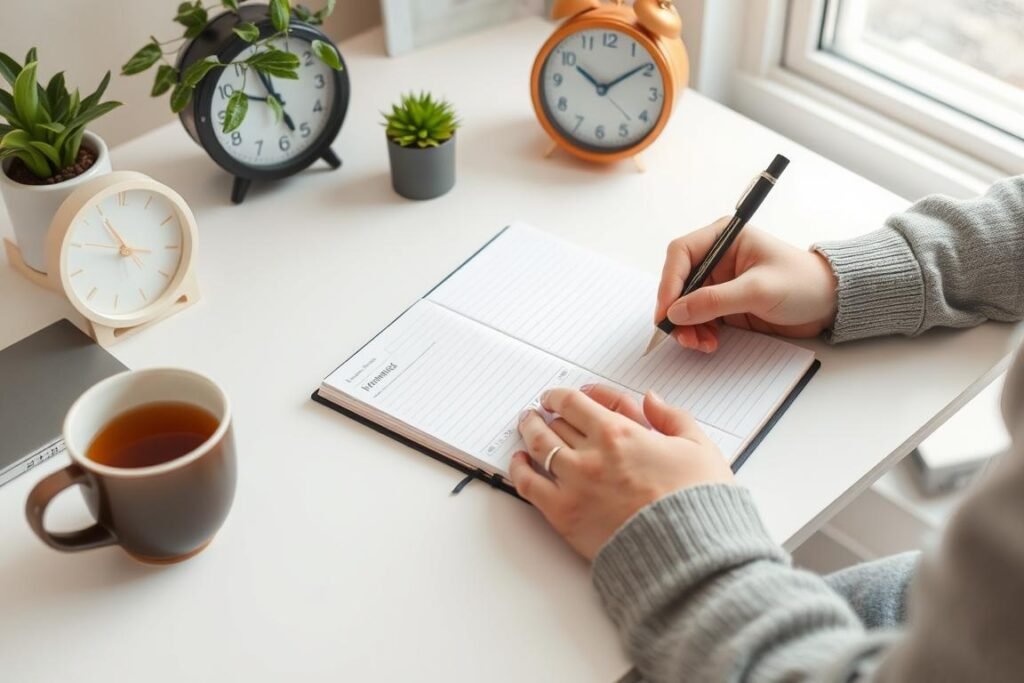
How long should my morning routine be to improve sleep?
An effective sleep-enhancing morning routine doesn’t need to be lengthy. Even 15-30 minutes of intentional activities can make a significant difference. The key is consistency rather than duration. If time is limited, prioritize light exposure and hydration, which have the most direct impact on circadian rhythm regulation.
Can a morning routine help with insomnia?
Yes, a consistent morning routine can be particularly beneficial for people with insomnia. By strengthening your circadian rhythm through regular wake times and morning light exposure, you help your body develop stronger sleep-wake signals. Many sleep medicine specialists recommend morning routines as part of cognitive behavioral therapy for insomnia (CBT-I), which is considered the gold standard treatment.
How soon will I notice sleep improvements after starting a morning routine?
Most people begin to notice improvements in their sleep quality within 1-2 weeks of implementing a consistent morning routine. However, the full benefits may take 3-4 weeks to develop as your circadian rhythm adjusts. Consistency is crucial during this adaptation period—even occasional deviations can delay progress.
Sample 7-Day Morning Routine for Better Sleep
To help you get started, here’s a 7-day plan that gradually introduces sleep-enhancing morning habits. This progressive approach makes it easier to adopt sustainable changes.
| Day | Morning Focus | Key Activities | Expected Sleep Benefit |
| Day 1 | Consistent Wake Time | Set alarm for same time, avoid snooze button | Begins stabilizing circadian rhythm |
| Day 2 | Light Exposure | Open curtains immediately, 10 min outdoor time | Suppresses morning melatonin, sets sleep timer |
| Day 3 | Hydration | 16oz water upon waking, before caffeine | Improves daytime energy, reduces evening fatigue |
| Day 4 | Gentle Movement | 5-min stretching or yoga routine | Reduces stress hormones, promotes deeper sleep |
| Day 5 | Nutrition | Balanced breakfast with protein and complex carbs | Stabilizes blood sugar, prevents sleep-disrupting crashes |
| Day 6 | Planning | 5-min journaling and day planning | Reduces bedtime anxiety and racing thoughts |
| Day 7 | Full Routine | Combine all elements into cohesive routine | Comprehensive circadian rhythm regulation |

Ready to Transform Your Sleep Quality?
While this article provides a foundation for using morning routines to improve sleep, our comprehensive sleep guide offers a complete system for optimizing every aspect of your sleep. Discover advanced techniques, personalized recommendations, and a step-by-step implementation plan.
Conclusion: Your Morning Routine Is the Key to Better Sleep

Implementing a consistent morning routine for better sleep is one of the most effective yet underutilized approaches to improving sleep quality. By working with your body’s natural circadian rhythm rather than against it, you create the conditions for restorative sleep to occur naturally.
Remember that the key elements—consistent wake time, morning light exposure, gentle movement, proper hydration and nutrition, and intentional planning—work synergistically to regulate your internal clock. Even implementing just one or two of these practices can begin to improve your sleep quality.
Start small, be consistent, and give your body time to adjust to your new routine. Within a few weeks, you may find yourself falling asleep more easily, experiencing deeper sleep, and waking feeling more refreshed—all by making simple changes to how you start your day.
Your journey to better sleep begins tomorrow morning. Which element will you implement first?

